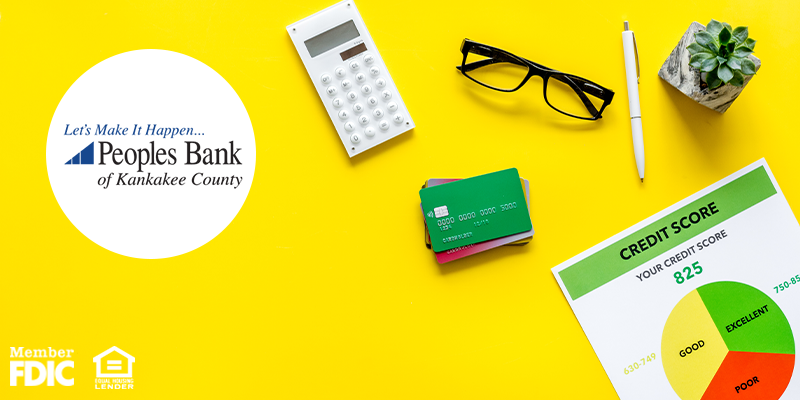Posted On: July 19, 2022 by Peoples Bank of Kankakee County in: Personal Finances Saving

We’ve all heard that a good credit score is important. But what is it and why is it so important? Take a few minutes to increase your knowledge and understand what it takes to build a good credit score.
What is a Credit Score?
A credit score is a 3-digit number between 300 and 850. It is a number that lenders use to help them predict how likely it is that they will be repaid on time if they give a person a loan or credit card. Your personal credit score is based upon your credit history and can change when new information is reported to the credit bureaus.
What Does Your Credit Score Impact?
Your credit score is important because it impacts your financial life and determines whether you qualify for a mortgage, credit card, or other type of loan. It affects the interest rate you are charged and the credit limit you are given. A credit score may also influence a deposit you may be required to make on things like utilities, phone services, rental properties, and more. Lenders, insurance agents, and landlords typically run a credit check before considering your application.
What Do You Want Your Credit Score to Look Like?
A high credit score is considered good and more worthy of consideration. An excellent score ranges from 800 to 850 with a poor score at 300 to 579. The middle range (580 – 799) is considered fair to very good.
You may be wondering, what if you do not have a credit score? Not having a credit score means you have never opened a credit account, like a loan or credit card. Having no credit score puts you in a similar predicament as having bad credit because you are not able to prove to lenders that you are reliable. It is important for everyone to work towards building a good credit score.
What Impacts Your Credit Score?
Your credit score is impacted by five main factors: payment history, total amount owed, length of credit history, types of credit, and new credit you’ve recently opened. Payment history is the most important ingredient in credit scoring. Even one missed payment can negatively impact your score.
How to Build a Good Credit Score
Since it’s important to have a good credit score, let’s look at ways to build just that:
1. Pay your bills on time – On time payments for six months will positively affect your score.
2. Use a credit card – Start with one credit card and carefully avoid the mistake of opening too many and accumulating large balances. Too many inquiries into your credit and too many available credit cards can negatively affect your credit score. Remember that payment history is the most important part of your credit score, so consistently paying your balances on time improves your credit score.
3. Don’t close your credit card account – Stop using a credit card rather than closing it to avoid negatively impacting your score.
4. Only use some of your available credit – Credit is not a green light to go out and spend wildly. Only buy things you can afford to pay back within a reasonable timeframe. The key to a good credit score is discipline.
5. Monitor your credit score on a regular basis – You are entitled to a free copy of your credit reports every 12 months from each of the three nationwide credit bureaus by visiting www.annualcreditreport.com.
As you can see, there are many benefits to having a good credit score. The rewards you will reap include approved loans, better car insurance rates, lower credit card interest, and more housing options. A good credit score allows you to do the things you wish financially. If you have questions about credit score or wish to speak with a member of the Peoples Bank lending team, feel free to contact us here.

